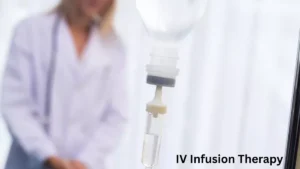IV Infusion Therapy: Intravenous (IV) infusion therapy is a medical procedure that has gained tremendous popularity—not only in hospitals but also in wellness clinics and cosmetic centers worldwide. Whether it is used to deliver vital medications, rehydrate patients, or provide nutrient boosts, IV therapy offers a fast and effective way to administer fluids directly into the bloodstream. This article will cover everything you need to know about IV infusion therapy, including how it works, its benefits, risks, applications, costs, and frequently asked questions.
| Aspect | Details |
|---|---|
| Common Uses | Hydration, medication delivery, nutritional support, blood transfusion, immune boosting. |
| How It Works | Needle insertion → connection to IV bag → infusion into bloodstream → monitoring → removal. |
| Types of IV Therapy | Hydration, vitamin/mineral drips, medication delivery, TPN, blood products, detoxification. |
| Common Ingredients | Electrolytes, vitamins (C, B-complex, D), amino acids, glutathione, NAD+, medications. |
| Benefits | Fast absorption, customized treatment, effective hydration, improved nutrient uptake, immunity boost. |
| Risks and Side Effects | Infection, allergic reaction, infiltration, extravasation, phlebitis, rare nerve damage. |
| Who Can Benefit? | Patients with deficiencies, athletes, chronic illness sufferers, post-surgery patients. |
| Who Should Avoid? | Severe kidney/heart issues, allergies to IV ingredients, pregnancy (consult first). |
| Typical Session Duration | 30 minutes to 1 hour. |
| Cost Range in India | ₹1,000 to ₹50,000+ depending on therapy type and location. |
| Important Considerations | Certified staff, sterile environment, advanced equipment, customized treatment, transparent pricing. |
What Is IV Infusion Therapy?
IV infusion therapy involves inserting a small catheter or needle into a vein, typically in the arm or hand, through which fluids, medications, vitamins, or nutrients are administered directly into the bloodstream. This method bypasses the digestive system, enabling rapid absorption and quicker therapeutic effects compared to oral medications or supplements.
Medical professionals widely use IV infusion therapy in hospitals for hydration, medication delivery, blood transfusions, and nutritional support. In recent years, IV therapy has also become popular in wellness and aesthetic clinics, offering vitamin drips for energy enhancement, immune support, and anti-aging benefits.
Read more: Ozempic Injection: Benefits, Uses, Dosage, Side Effects, and Safety Guide
How Does IV Infusion Therapy Work?
The process of IV infusion therapy is straightforward but must be performed by trained healthcare professionals to ensure safety and effectiveness. Here’s a step-by-step overview:
- Vein Access: A trained nurse or doctor inserts a sterile needle or catheter into a suitable vein, usually in the arm or hand.
- Connection: The catheter is connected to an IV bag containing the prescribed fluids or medications.
- Infusion: Fluids drip slowly through the catheter into the bloodstream, either by gravity or via an infusion pump that precisely controls the flow rate.
- Monitoring: Healthcare providers monitor the infusion site and the patient’s response throughout the treatment to prevent complications.
- Completion: After the full dose is administered, the catheter is carefully removed, and the insertion site is cleaned and bandaged.
Read more: Best Insurance Company in UAE Orient Insurance
Types of IV Infusion Therapy
IV infusion therapy encompasses various treatments tailored to meet different medical or wellness needs. Some common types include:
- Hydration Therapy: Used to rehydrate patients suffering from dehydration due to illness, surgery, or excessive physical exertion.
- Vitamin and Mineral Drips: Customized mixtures of vitamins (such as Vitamin C, B-complex, and D), minerals, and antioxidants to boost energy, improve immunity, or aid skin health.
- Medication Delivery: IV therapy is often used to administer antibiotics, pain medications, chemotherapy drugs, or other medicines that require fast or controlled absorption.
- Total Parenteral Nutrition (TPN): A specialized therapy for patients who cannot eat or absorb nutrients through the gastrointestinal tract.
- Blood Product Administration: Includes transfusions of blood, plasma, or platelets for patients in need.
- Detoxification and Immune Boosting: Wellness clinics may offer IV detox drips containing glutathione or NAD+ to enhance cell repair and immunity.
Read more: Pico Laser Treatment: The Revolutionary Solution for Skin Rejuvenation and Tattoo Removal
Common Ingredients Used in IV Therapy
The effectiveness of IV infusion therapy largely depends on the composition of the fluids infused. Common ingredients include:
- Electrolytes: Sodium, potassium, magnesium to restore electrolyte balance.
- Vitamins: Vitamin C (immune support), B-complex vitamins (energy metabolism), Vitamin D (bone health).
- Amino Acids: Building blocks of proteins, important for muscle repair and immune function.
- Glutathione: A powerful antioxidant that supports detoxification.
- NAD+ (Nicotinamide Adenine Dinucleotide): A coenzyme involved in energy production and anti-aging therapies.
- Medications: Antibiotics, chemotherapy agents, or other pharmaceuticals based on patient needs.
Benefits of IV Infusion Therapy
IV infusion therapy provides several advantages, making it a preferred choice in both medical and wellness contexts:
- Rapid Absorption: Direct entry into the bloodstream allows for faster therapeutic effects than oral intake.
- Customized Treatment: IV fluids can be tailored to suit individual nutritional or medical requirements.
- Effective Hydration: Quickly restores fluid balance in cases of dehydration or illness.
- Improved Nutrient Uptake: Helps patients with absorption issues or digestive problems receive essential nutrients.
- Enhanced Immune Support: Vitamin and antioxidant drips can boost immune function and improve recovery.
- Convenience: Many IV therapy sessions take under an hour, making it accessible and time-efficient.
Risks and Side Effects
While IV infusion therapy is generally safe when performed by trained professionals, there are some risks and potential side effects to be aware of:
- Infections: Risk of infection at the catheter insertion site or bloodstream if sterile procedures are not followed.
- Allergic Reactions: Some patients may react to components in the IV solution or medication.
- Infiltration: Leakage of fluid into surrounding tissues causing swelling or discomfort.
- Extravasation: Leakage of potentially harmful medication into tissues, causing damage.
- Phlebitis: Inflammation of the vein due to catheter irritation.
- Rare Complications: Nerve damage or blood clots, though uncommon, can occur.
Who Can Benefit from IV Therapy?
IV infusion therapy suits a wide variety of individuals, including:
- Patients with Nutrient Deficiencies: Those with malabsorption syndromes or dietary restrictions.
- Athletes and Fitness Enthusiasts: For faster recovery, hydration, and energy replenishment.
- Individuals with Chronic Fatigue or Illness: To improve energy levels and overall wellbeing.
- Post-Surgery or Cancer Patients: For medication delivery, nutrition, and faster healing.
- People Needing Rapid Rehydration: From illness, heat exhaustion, or intense physical activity.
Who Should Avoid IV Infusion Therapy?
Certain individuals should consult with a healthcare provider before undergoing IV therapy:
- Patients with severe kidney or heart conditions where fluid overload is a risk.
- Individuals with known allergies to IV solution ingredients.
- Pregnant or breastfeeding women should seek personalized advice.
Cost of IV Infusion Therapy in India
The cost of IV infusion therapy in India varies depending on the type of infusion, ingredients used, clinic location, and expertise of medical professionals. Here is a general price overview:
| Type of IV Therapy | Price Range (INR) |
|---|---|
| Basic Hydration | ₹1,000 – ₹3,000 per session |
| Vitamin & Mineral Drips | ₹3,000 – ₹10,000 |
| Medication Delivery (IV meds) | ₹5,000 – ₹20,000+ |
| Total Parenteral Nutrition | ₹15,000 – ₹50,000 per day |
| Specialty Wellness Drips | ₹5,000 – ₹15,000 |
Prices are generally higher in metro cities like Mumbai, Delhi, and Bangalore due to higher operational costs and advanced equipment.
Choosing the Right Clinic for IV Therapy
When opting for IV infusion therapy, consider these important factors:
- Certified Medical Staff: Ensure the clinic has trained nurses and doctors certified in IV administration.
- Sterile Environment: The procedure requires strict hygiene to avoid infections.
- Advanced Equipment: Clinics using infusion pumps and monitoring devices offer better safety.
- Customized Treatments: Look for providers who tailor solutions based on individual health assessments.
- Transparent Pricing: A reputable clinic will clearly outline costs and what is included.
Frequently Asked Questions (FAQs)
Q: Is IV infusion therapy painful?
A: Most patients feel minimal discomfort during catheter insertion; the infusion itself is painless.
Q: How long does a typical session take?
A: Sessions usually last between 30 minutes to 1 hour depending on the type and volume of fluid administered.
Q: How often can I get IV therapy?
A: Frequency depends on individual needs and physician recommendations; some wellness protocols suggest weekly or monthly sessions.
Q: Is IV therapy better than oral supplements?
A: IV therapy bypasses the digestive system, offering faster and more efficient absorption, especially beneficial for those with absorption issues.
Q: Are there any side effects?
A: Side effects are rare but may include mild bruising, swelling, or infection at the injection site.
Conclusion
IV infusion therapy is a versatile and effective medical treatment that delivers hydration, nutrients, and medications directly into the bloodstream. It provides rapid relief, customizable treatments, and has applications ranging from emergency care to wellness and anti-aging. While generally safe, IV therapy should always be administered by trained healthcare professionals in a controlled environment to minimize risks.
For individuals seeking to improve their health, manage chronic conditions, or boost energy and immunity, IV infusion therapy can be a valuable option. Always consult with your healthcare provider to determine the best treatment plan tailored to your unique needs.
If you are looking for reliable IV infusion therapy clinics in India or metro cities like Bangalore, Mumbai, or Delhi, ensure you choose providers who prioritize safety, hygiene, and personalized care.





